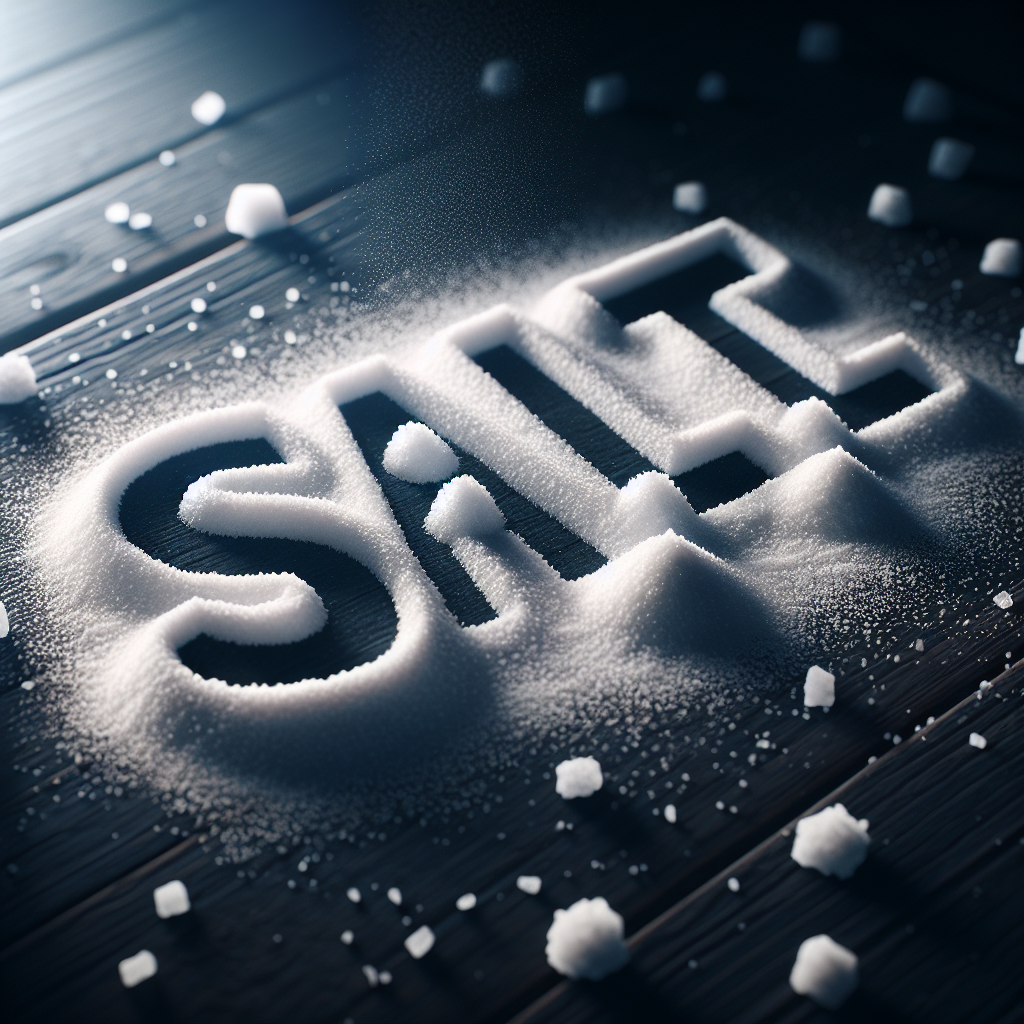As an Amazon Associate I earn from qualifying purchases.

Salt, often referred to as ‘white gold’ in ancient times due to its value and versatility, is not just a vital culinary ingredient but also a powerful element in various spiritual and magical practices. Historically, salt has been used for its purifying and protective properties across different cultures and religions. It is believed to have the ability to ward off negative energy and is commonly used in spells and rituals. The practice of using salt in spells is deeply rooted in folk magic, and it is an integral component in many traditions of witchcraft and ceremonial magic, indicating its enduring significance in spiritual contexts.
To employ salt in magical workings, one must understand that the intentions set during the spell are pivotal. Salt’s role is often to act as a conduit for those intentions, amplifying their power and providing a physical anchor for the desired outcomes. Traditionally, it is used to create boundaries or barriers against negative influences, a practice still prevalent today. Sea salt is especially prized for its association with the natural power of the ocean and is often preferred for purification and cleansing rituals. Engaging with this ancient practice, one might be surprised to know that a pinch of salt is not merely for flavor—it might also be casting a protective shield in the practitioner’s life.
When using salt in spells, many practitioners adhere to specific rituals and guidelines to enhance the efficacy of their workings. For instance, a common method involves casting a circle of salt around the person or object to be protected, symbolizing a barrier that negative energies cannot cross. The exact nature of the salt used can also be significant, with different types of salt—such as Himalayan pink salt, black salt, or kosher salt—being selected for particular qualities or associations. Additionally, the lunar phase might be taken into account, with many spells calling for salt to be charged under the full moon’s light to imbue it with additional power. This attention to detail underscores the thoughtful and intentional nature of using salt in spells.
Understanding the symbolism associated with salt can deepen one’s appreciation for its role in magical practices. Salt represents the Earth element, grounding and stability, and it is often juxtaposed with water, representing fluidity and intuition, to balance and harmonize energies. When used in spells, salt may be blended with herbs, oils, or other elements to tailor the spell to a specific purpose, such as love, protection, or healing. The precise combination and ritual can be as unique as the individual practitioner, with many seasoned spell-casters developing their own personalized blends and rituals to suit their particular needs and spiritual path. This customization aspect of spellwork with salt highlights the versatility and personal nature of the practice.
html
What Are the Benefits and Methods of Incorporating Salt into Spellwork?
Salt has been used throughout history in various cultures for purification, protection, and magical rituals due to its elemental significance and preservative qualities. As a mineral, salt is associated with earth and water energies, making it a grounding and cleansing agent in metaphysical practices. When used in spells, salt is believed to enhance communication with the supernatural, create barriers against negative influences, and acts as a conductor for spiritual energy. It is particularly renowned for its ability to absorb psychic vibrations and cleanse spaces of unwanted presences. Understanding the appropriate rituals and methods for integrating salt into your spellwork can significantly augment the potency of your intentions. In the forthcoming sections, we will delve into the specific spells that effectively harness the mystical properties of salt and guide you on how to leverage this powerful mineral in your personal spiritual practices.
Salt has been a valued commodity throughout history, not only for its culinary uses but also for its purported magical properties. In various cultures and traditions, salt has been associated with purification, protection, and blessing. When it comes to using spells with salt, it is important to understand the different types and their specific uses, as well as the associated rituals and intentions.
**Types of Salt and Their Uses**
There are several varieties of salt, each with its own unique properties that can be leveraged in spellcasting:
1. **Table Salt:** Commonly used for cleansing and protection. It can be sprinkled around the perimeter of a home to create a barrier against negative energy.
2. **Sea Salt:** Known for its connection to the element of water and the ocean’s natural purifying qualities. Sea salt is often used in rituals to cleanse objects or spaces.
3. **Himalayan Pink Salt:** Believed to contain energetic vibrations that can balance the body’s chakras. It is used in spells related to healing and emotional balance.
4. **Black Salt:** A blend of sea salt and charcoal, sometimes with added black dye or ashes. Black salt is typically used for banishing, protection, and breaking hexes.
5. **Kosher Salt:** While similar to table salt, the larger grains can be useful in creating salt lines or figures for rituals.
**Rituals and Intentions**
When using spells with salt, the caster’s intention is paramount. Here are some ways to incorporate salt into magical practices:
– **Casting a Circle:** By sprinkling salt around yourself, you can cast a protective circle for meditation or spell work, ensuring a safe, sacred space free from unwanted energies.
– **Home Protection:** Lining windowsills and doorways with salt can act as a barrier to prevent negative influences from entering the home.
– **Cleansing Crystals:** Many practitioners use saltwater to cleanse their crystals, though care should be taken as salt can damage softer minerals.
– **Purification Bath:** Adding sea salt to a bath can provide a spiritual cleansing, symbolically washing away negativity and energetic impurities.
**The Role of Chants and Visualizations**
While salt is a powerful tool on its own, combining it with chants and visualizations can amplify its effect. Chanting a specific intention while using salt can focus the mind and direct energy, enhancing the spell’s potency. Similarly, visualizing the desired outcome while sprinkling or placing salt can reinforce the caster’s intention.
**Precautions and Respectful Practices**
Always consider the ecological impact of your practices. Avoid using salt in ways that could harm the environment or disrupt natural ecosystems. Furthermore, respect the cultural origins of any spells or rituals and seek to learn from authentic sources rather than appropriating or misusing traditional practices.
**Creative Spell Crafting with Salt**
Experimentation is encouraged in spellcasting. Practitioners often mix salt with herbs, oils, or other substances to tailor spells to their needs. Documenting these spells in a grimoire or journal can help refine techniques and track results.
**Recent Data on Salt in Spellcasting**
While hard statistics on the use of salt in spells are scarce due to the private nature of most practitioners’ work, the growing interest in Wicca, paganism, and esoteric practices has been reflected in increased sales of ritual supplies. According to a 2021 market report, the global market for alternative spirituality-related products, including items like ritualistic salt, has been growing steadily, indicating a rising number of individuals engaging in such practices.
Q1: What is the significance of salt in spellcasting?
A1: Salt has been used for centuries in various traditions for its purifying and protective properties. In spellcasting, it’s believed to help cleanse, protect, and create sacred spaces, serving as a barrier against negative energy.
Q2: Can I use any type of salt for spells, or does it have to be a specific kind?
A2: While many practitioners prefer to use sea salt or Himalayan salt for their purity and mineral content, you can use any type of salt. The intention behind the use is often considered more important than the salt type.
Q3: How do I create a salt circle for a spell?
A3: To create a salt circle, evenly spread a ring of salt around the area where you’ll be performing your spell. Ensure the circle is unbroken to maintain the protective barrier you’re forming.
Q4: Can I reuse salt that has been used in a previous spell?
A4: It’s not recommended to reuse salt from an old spell, especially if it was used to absorb negative energy. After a spell, you should properly dispose of the used salt, often by returning it to the earth.
Q5: How should I dispose of salt after a spell?
A5: Disposing of spell salt should be done respectfully. You can return it to the earth by burying it, scatter it into the wind or a body of running water, or simply throw it away if it’s heavily laden with negative energy.
Q6: Is there a special way to activate salt for spell use?
A6: You can activate or charge salt for spell use by placing it in sunlight or moonlight, reciting an incantation or blessing over it, or visualizing it being filled with the energy you wish to use in your spell.
Q7: How much salt is typically needed for a spell?
A7: The amount of salt needed can vary greatly depending on the spell. A small pinch may suffice for a simple protection charm, while a larger circle or barrier may require a significant quantity. Use your intuition and follow any guidelines specific to the spell.
Q8: What should I do if a spell with salt doesn’t seem to work?
A8: If a salt spell isn’t working, reassess your intentions, ensure you followed the spell’s instructions carefully, and check if there were any distractions that might have affected your focus. Remember, the effectiveness of a spell can also depend on external factors beyond your control.
Q9: Can salt spells be combined with other elements or ritual objects?
A9: Yes, salt spells can be enhanced by combining them with other elements, such as herbs, crystals, or candles, to tailor the spell to your specific needs and strengthen its effects.
Q10: Are there ethical considerations I should be aware of when casting spells with salt?
A10: While casting spells, always be mindful of your intentions, ensuring they do not harm others or manipulate free will. Additionally, consider the environmental impact of disposing of salt and choose methods that do not harm the earth or waterways.

Conclusion
Salt has been a potent tool in various practices, often used to purify, protect, and enhance spiritual work. Throughout the article, we’ve delved into the significance of salt in spellcraft, exploring its various types, including sea salt, table salt, and Himalayan pink salt, each with their own unique properties and best-suited applications. We’ve learned how to incorporate salt into rituals for cleansing spaces, creating protective barriers, and casting circles to establish sacred space. Techniques for charging salt with intentions through visualization and the importance of disposing of used salt in a respectful manner have been key insights, ensuring practitioners can effectively harness the mineral’s power without unintended consequences.
Moreover, we provided practical advice on how to blend salt with herbs and essential oils to amplify spellwork, and the significance of color-coded salts for targeting specific aspirations—be it love, wealth, health, or psychic awareness. It’s clear from our exploration that salt is not a mere condiment but a versatile and powerful component in many spiritual traditions. Understanding the ethical considerations, such as the potential environmental impact and respecting cultural practices, is crucial for any practitioner. With this knowledge, one can confidently integrate salt into their spellcasting repertoire, using it to manifest positive change while staying rooted in a practice that honors the earth and its ancient wisdom.
Amazon and the Amazon logo are trademarks of Amazon.com, Inc, or its affiliates.
Continue Your Magical Journey
Free Witchcraft Starter Kit
Get 6 free printable PDFs: grimoire pages, moon calendar, spells, crystals, herbs, and tarot journal.
We respect your privacy. Unsubscribe anytime.
Enhance Your Practice
As an Amazon Associate, I earn from qualifying purchases.

